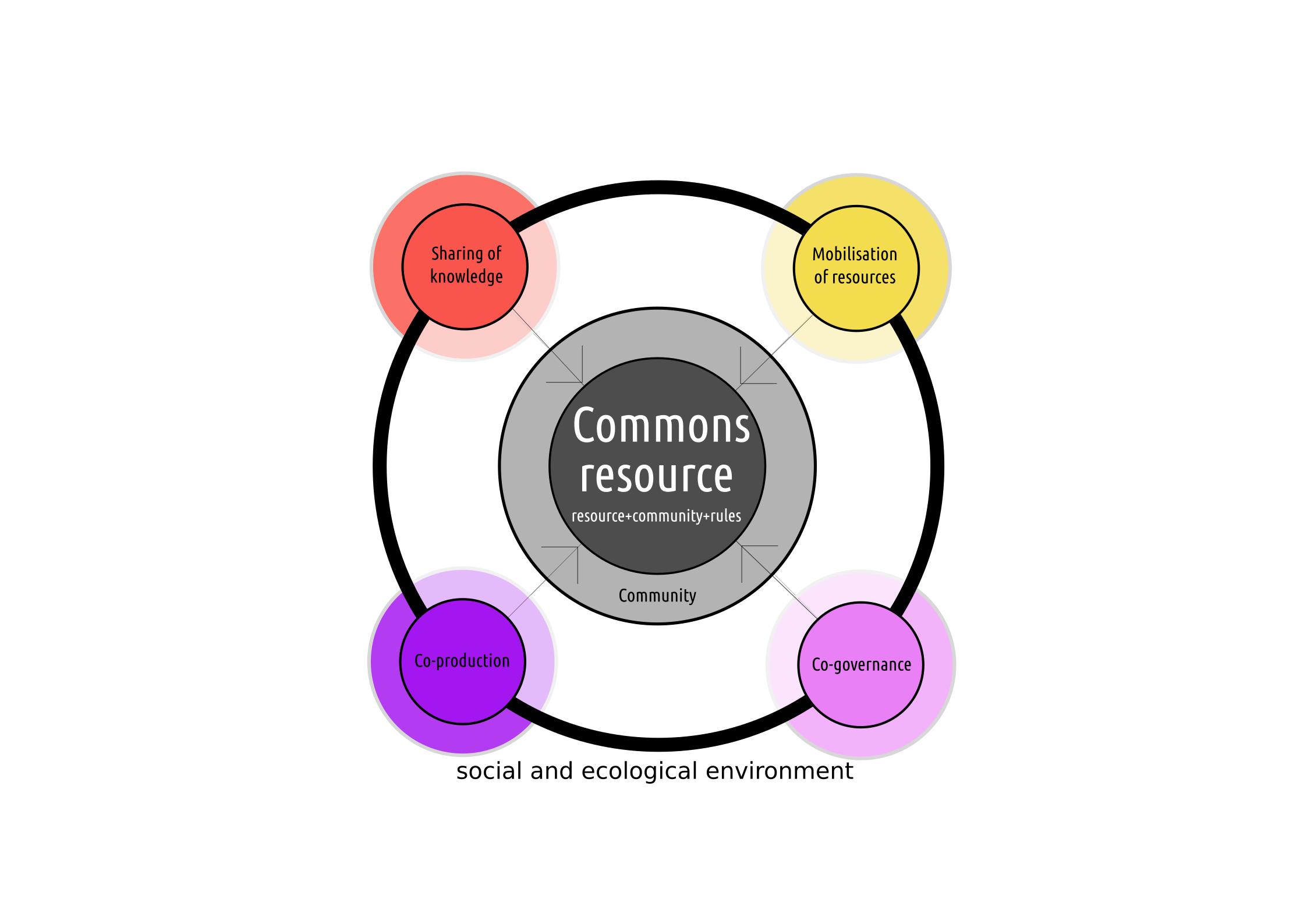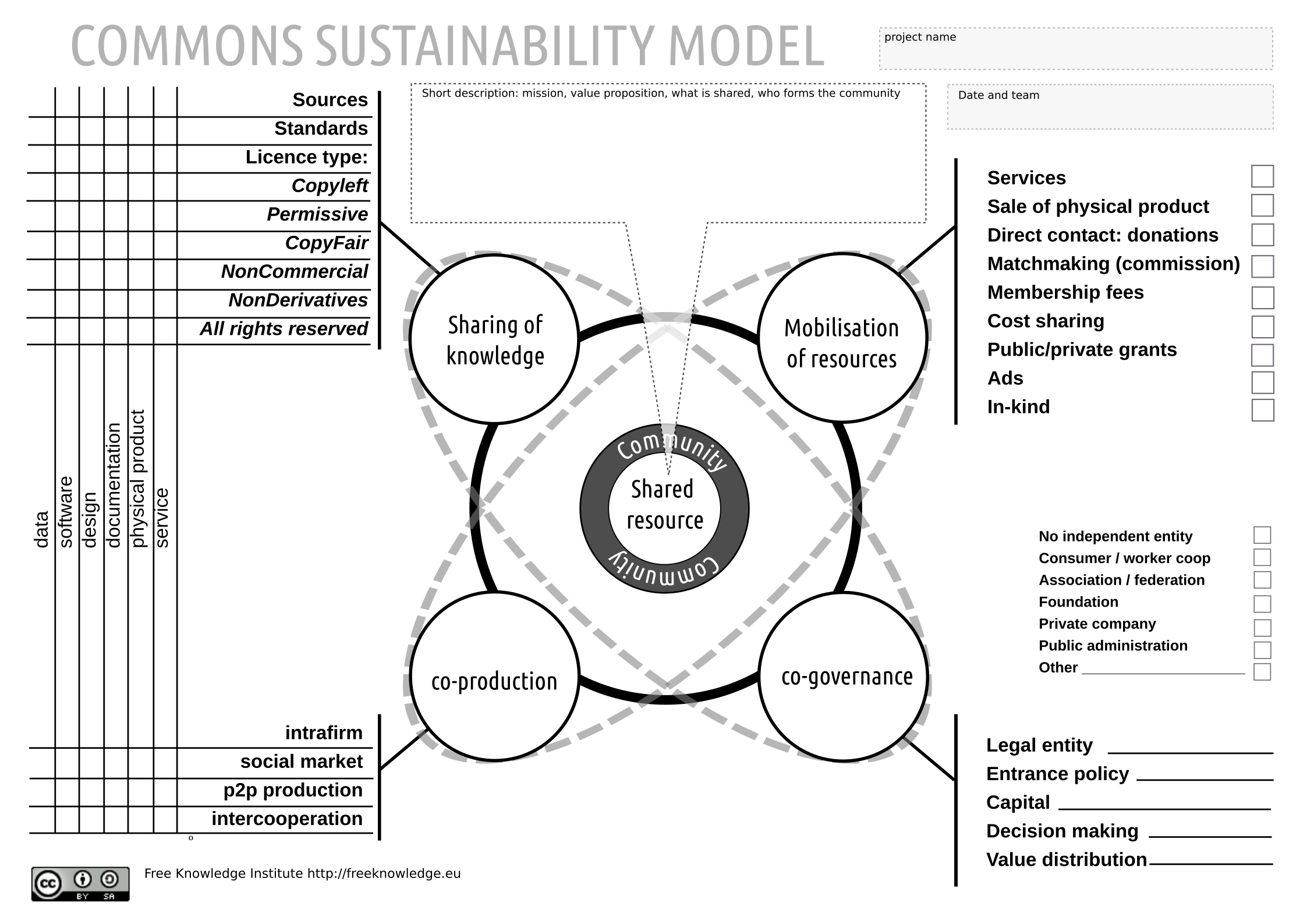The Five Pillar Framework: Commons-Based Business Modeling

The Five Pillar Framework: A Commons-Based Business Model
The Five Pillar Framework represents a comprehensive approach to developing sustainable business models that align with commons principles. Originally developed by the Free Knowledge Institute (FKI), this framework has evolved into a comprehensive methodology for creating and analysing collaborative, community-driven organisations that prioritise shared value over extractive practices.
Origins and Development
The Five Pillar Framework first emerged in 2016 when FKI developed it as part of the Digital DIY research project. The initial framework was published in a European Commission report, laying the theoretical foundation for what would become a practical tool for commons-based business development. The original report detailed how digital fabrication and collaborative practices could be structured around sustainable principles.
Building on this theoretical foundation, FKI implemented the framework practically when it initiated the first edition of Barcelona Activa’s collaborative support programme, La Comunificadora. This program used the Five Pillar framework as the guiding principle for participating projects to develop their business models in alignment with commons values.

Institutional Evolution
In 2017, the framework’s development took a significant step forward when FKI co-founded the femProcomuns multistakeholder cooperative in Barcelona. Within this cooperative structure, FKI helped establish a dedicated activity group called “Transitioning,” which focused on supporting organizations in their transition toward commons-based models. This cooperative activity group became a practical laboratory for refining and applying the framework.
As La Comunificadora evolved through subsequent editions, femProcomuns took over the coordination role whilst FKI continued to provide support. The Five Pillar model remained the leading framework for the programme, and through collaboration with LabCoop, the model was further developed and enhanced with specific canvases designed for each pillar. These tools facilitated hands-on learning and made the framework more accessible to practitioners. More information about this evolution can be found on the femProcomuns website.
Practical Applications
The framework has been extensively used in various contexts beyond La Comunificadora. Barcelona Activa, Barcelona City’s economic development agency, has employed the framework in a series of workshops focused on Platform Cooperativism, demonstrating its relevance for understanding and developing alternative economic models in the digital age.
The versatility of the Five Pillar Framework lies in its dual application: it serves both as a research tool for analyzing existing initiatives to understand how their sustainability models work, and as a practical methodology for developing new business models or evolving existing ones toward commons alignment.
The Five Pillars Explained
The Commons Sustainability model underlying the Five Pillar Framework is built on five interconnected principles that collectively create a comprehensive approach to sustainable, community-driven business development:
-
Shared Knowledge: Organisations commit to open sharing of knowledge, information, and learning, rejecting proprietary approaches that limit access to essential resources.
-
Co-governance: Decision-making processes are participatory and democratic, ensuring that all stakeholders have a voice in the organisation’s direction and operations.
-
Co-production using Open Source Technologies: Production processes leverage open source technologies and collaborative methods, enabling transparency and community contribution.
-
Non-extractive Revenue Strategies: Revenue generation focuses on mobilising resources that help regenerate and strengthen the commons rather than extracting value from them.
-
Community-Driven Shared Mission: Organisations maintain a clear focus on serving community needs and advancing shared objectives rather than purely individual or corporate interests.
Resources and Further Information
For those interested in exploring the Five Pillar Framework in greater depth, several comprehensive resources are available:
- The detailed Commons Sustainability model explanation on the femProcomuns website
- The complete Five Pillar framework methodology and tools
- The original Digital DIY report that first introduced the framework
Recognition and Impact
The framework has gained recognition in various media and academic contexts. La Vanguardia featured the FKI’s work in an article titled “El FKI defiende startups colaborativas que no acaben especulando” (The FKI defends collaborative startups that don’t end up speculating), highlighting the framework’s relevance for creating sustainable alternatives to extractive business models.
The framework was also featured in the 2019 Sharing Cities Action book publication, with a dedicated chapter XVIII titled “Model de sostenibilitat dels 5 pilars del Procomú” (The 5 Pillar Sustainability Model of the Commons), pages 417-431, available in the complete publication.
Conclusion
The Five Pillar Framework represents more than just a business model; it embodies a philosophical approach to economic activity that prioritises community wellbeing, environmental sustainability, and democratic participation. As organisations worldwide seek alternatives to extractive capitalism, the framework provides a practical roadmap for creating enterprises that generate value whilst strengthening the commons.
Through its evolution from theoretical concept to practical methodology, the Five Pillar Framework demonstrates the potential for academic research to create real-world impact in building more equitable and sustainable economic systems. Its continued development and application across diverse contexts suggest its enduring relevance for the growing commons movement.